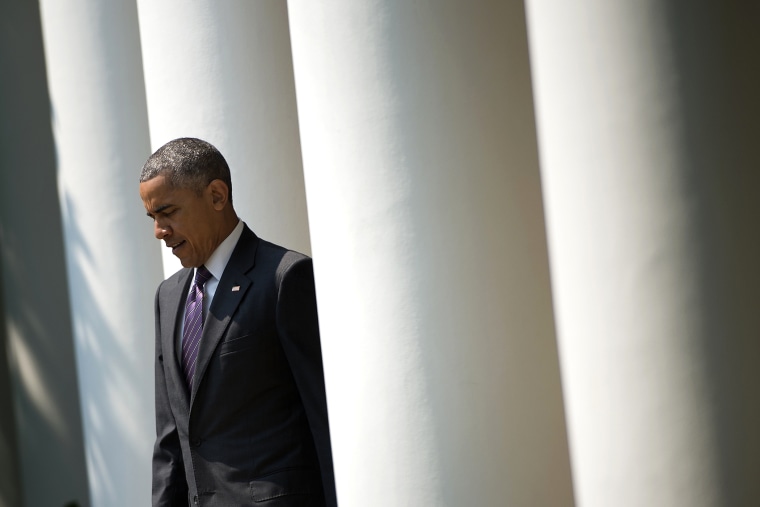The White House's Rose Garden, located just outside the Oval Office, has played host to quite a bit of history lately. On Thursday, President Obama delivered a brief address in the Rose Garden to highlight the Supreme Court's ruling in support of the Affordable Care Act. A day later, he returned to the same location to celebrate national marriage equality.
And this morning, there was Obama speaking again from the Rose Garden, and once again making history. NBC News reported:
"More than 54 years ago, at the height of the Cold War, the United States closed its embassy in Havana," Obama said this morning. "Today, I can announce that the United States has agreed to formally re-establish diplomatic relations with the Republic of Cuba, and re-open embassies in our respective countries. This is a historic step forward in our efforts to normalize relations with the Cuban government and people, and begin a new chapter with our neighbors in the Americas."
This isn't to say the United States and Cuba are suddenly buddies -- Obama emphasized that we'll "continue to have some very serious differences" -- but that the failed policy of the last half-century is no more.
The president said this morning, "Instead of supporting democracy and opportunity for the Cuban people, our efforts to isolate Cuba, despite good intentions, increasingly had the opposite effect -- cementing the status quo and isolating the United States from our neighbors in this hemisphere. The progress that we mark today is yet another demonstration that we don't have to be imprisoned by the past. When something isn't working, we can -- and will -- change."
Anticipating Republican complaints, Obama added, "Yes, there are those who want to turn back the clock and double down on a policy of isolation. But it's long past time for us to realize that this approach doesn't work. It hasn't worked for 50 years. It shuts America out of Cuba's future, and it only makes life worse for the Cuban people."
We talked just yesterday about recent developments, and the degree to which they position Obama as one of history's most consequential presidents, but we largely focused on domestic policy. This morning's announcement is a reminder that Obama's foreign policy breakthroughs matter, too.
For decades, presidents from both parties stuck to a policy that didn't advance anyone's interests. A combination of inertia and fear left that policy in place, year after year, administration after administration.
Obama and his team could have just grudgingly gone along with the status quo, but to their credit, they chose a smarter path, making history in the process.
When talking about the president's legacy, the overhaul of U.S. policy towards Cuba will be among his most notable foreign policy accomplishments.
And to reiterate a point from April, it’s worth emphasizing that the dramatic shift in the U.S. position enjoys support from a majority of Americans, a majority of Cuban Americans, and a majority of Cubans themselves. What’s more, American allies are delighted to see the new U.S. policy towards Cuba, as is much of Latin America, which routinely criticized the failed American policy.
